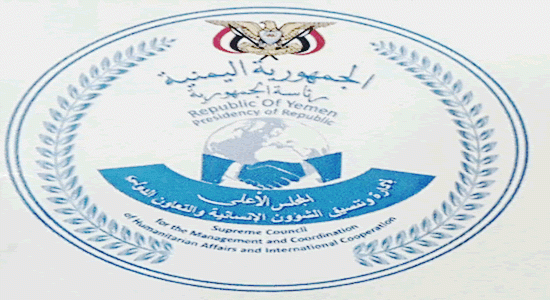The Supreme Council for Managing and Coordinating Humanitarian Affairs and International Cooperation affirmed that the US has failed militarily in Yemen and turned towards a policy of starvation through siege with a criminal strategy that violates all humanitarian norms and laws.
In a statement, the council said, on Tuesday, that “continuing to tighten the siege on Yemen and preventing the entry of fuel tankers and relief supplies to the port of Hodeidah is a war crime that violates all religious and moral covenants and UN laws.” The statement warned that the continuation of the siege poses a serious threat to the lives of millions of Yemenis, especially millions of people facing starvation and it poses an additional threat to the lives of thousands of patients.
The council added that the US’s policy of starvation will achieve nothing for Washington and its alliance, but more extend the humanitarian disaster and poverty in Yemeni, explaining that the tightening of the siege only expresses the moral and political decline that the countries involved in US-UAE-Saudi aggression have reached.
It pointed out that the unjustified restrictions on the flow of goods, medicine and fuel into Yemen and impeding their entry to the port of Hodeidah despite obtaining permits from the United Nations is a full-fledged war crime, stressing that the blockade imposed on Yemen is one of the main reasons that resulted in the worst humanitarian catastrophe in the world.
The Council held the aggression responsible for the deteriorating humanitarian situation in Yemen, which threatens the lives of millions of Yemenis as a result of the tightening of the blockade, the lack of fuel and its disastrous repercussions. It called on all organizations operating in Yemen to carry out their responsibilities and work to stop the siege and save the lives of millions of Yemenis, calling on the international community to carry out its legal and humanitarian duties to prevent all practices of aggression against the Yemeni people. It also called on the United Nations to fulfill its responsibilities and work to open the port of Hodeidah and Sana’a International Airport, and work to stop the siege on Yemen.
Saudi Arabia and the UAE, backed by the United States and regional allies, launched the war on Yemen in March 2015, with the goal of bringing the government of former Yemeni president Abd Rabbuh Mansour Hadi back to power.
The war has left hundreds of thousands of Yemenis dead and displaced millions more. It has also destroyed Yemen’s infrastructure and spread famine and infectious diseases there.
As part of its economic war, the US-Saudi aggression worked to drain about 97% of the Yemeni state’s resources, either by controlling them militarily such as oil and gas sources, freezing Yemeni foreign assets and transferring them to mercenaries and financing coalition operations, or imposing siege on the vital port of Hodeidah and the most important port after Aden, which is still in the grip of Sana’a and out of control of the aggression.
The coalition of aggression continues to piracy, detaining fuel ships, and preventing them from entering the port of Hodeidah, despite obtaining permits from UN, which aggravates the humanitarian catastrophe due to the suspension of many vital service sectors, especially hospitals, electricity, water, cargo trucks, as well as waste trucks.




















